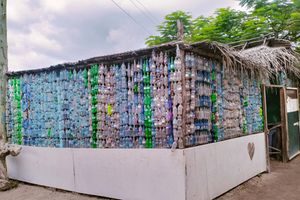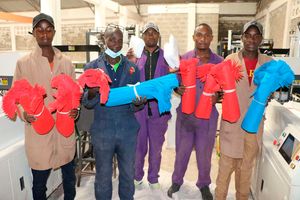Plastic Pollution: A silent threat even to unborn babies in Kenya

Data from Unicef show that the under-five mortality rate in Kenya stands at 37.2 deaths per 1,000 live births.
What you need to know:
- Relocating industries to designated areas distant from residential areas could be a potential solution.
- By doing so, they can reduce the negative impact of pollution on communities and prevent authorities from enforcing stricter regulations.
You've likely heard the following terms by this point: recycled, BPA-free, and plastic-free. Alternatively, these terms are so typical that you disregard them when purchasing a takeout snack during your lunch break, or the font size of these terms is negligible compared to the label of your preferred food item conveniently packaged in takeout containers. In short, plastic is ubiquitous and nearly indispensable to our daily lives. Do we ever imagine that plastic components can damage neonates in utero?
Studies showing traces of nano and microplastics in placentas show that the cycle of plastic harm is intergenerational, and the effects will live even in children who have yet to be born suggesting that today’s children absorb microplastics in their bodies as early as at foetal age.
Despite banning single-use plastic bag production in Kenya in 2017, there is still a significant amount of plastic in dump sites like Dandora, which generates about 850 tonnes of solid waste daily. The country also receives recycled plastic from other countries, making it difficult to completely eliminate waste production from developing countries. Some argue that this waste is a source of livelihood, a different approach to poverty in low-middle-income countries.
Data from Unicef shows that the under-five mortality rate in Kenya stands at 37.2 deaths per 1,000 live births. However, the mother's living environment is rarely regarded as the primary threat to her unborn baby. The same is true for children with recurring illnesses who are subjected to frequent hospital visits where antibiotics are administered; before they realize it, their young bodies have already developed resistance to infections.
The country actively participates in International Treaties for Pollution and is set to host the third session of the Intergovernmental Negotiating Committee on developing a legally binding instrument on plastic pollution at UNEP headquarters in Nairobi in November 2024. Article 42 of the Kenyan Constitution (2010) states that "every person has the right to a clean and healthy environment" and that the state would "eliminate processes and activities that are likely to endanger the environment."
Sections three and four of Chapter 3 of Kenya's Sustainable Waste Management Policy 2021 state "Create regulations for circumstances for disposing of waste that cannot be reused, reprocessed, or used as a source of energy, such as e-waste, asbestos, radioactive waste, and hazardous waste, all of which require a special permit, special treatment, and disposal. "Create operational, automation, and management guidelines for landfills. "
These are all evidence of legal frameworks for this agenda, but the public doesn't seem to be responding to it adequately. Health stakeholders also deal with these issues without considering the environmental factors that make children born in informal settlements less healthy.
But how many people know that they have the legal right to ask for sustainable spaces for future generations? To address this, we need an interdisciplinary approach where all social actors—education, health, entrepreneurs, and families speak in one voice. Since those most affected are deprived of the "circular economy of poverty," education can raise awareness. Raising and sustaining awareness of integrated waste management is essential in improving public participation and responsibility as change agents. Prioritize sustainable waste management education at all levels.
Healthcare workers can also play a crucial role by advocating for preventive healthcare and educating parents about the long-term effects of the environments around them on their children. By thoroughly assessing a patient's history and background during hospital visits, even for minor ailments like flu symptoms, healthcare professionals can identify potential underlying factors contributing to recurring illnesses.
Relocating industries to designated areas distant from residential areas could be a potential solution. By doing so, they can reduce the negative impact of pollution on communities and prevent authorities from enforcing stricter regulations.
This would also provide an opportunity for entrepreneurs to come up with innovative solutions and technologies that promote sustainability and environmental protection. Industries must take responsibility and actively work towards minimizing their pollution footprint for society's overall well-being.
Finally, Kenya must take responsibility for children's right to a healthy environment. Climate crisis is a child’s rights crisis because children are more vulnerable to climate and environmental shocks than adults for several reasons, including physical and physiological vulnerability and an increased risk of death.
If children are our future, we must advocate for them in every way possible, providing them with the best health care, not just medications, but making their homes habitable.
Pauline Ooko is an Advocate for Social Justice and Equity




